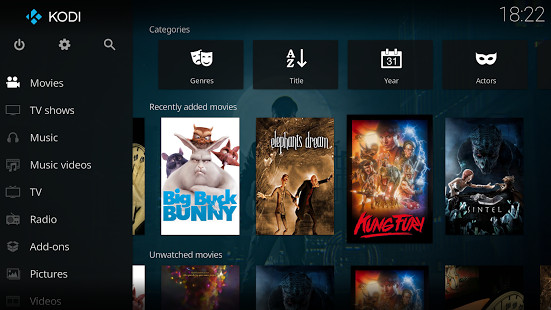LibreELEC is a JeOS (Just enough Operating System) based on Linux that creates a media center appliance platform for Kodi (formelly XBMC), and a fork of OpenELEC. The developers have now released LibreELEC v8.0.0 with the latest Kodi 17.0 “Krypton”.
Beside the update to Kodi 17, some of the changes since the last stable version (v7.95.3) include:
- Fix for TVheadend issues in the WeTek Play 2 DVB driver
- Fix for interactive governor causing slowdown issues on the WeTek Core
- Fix for missing Bluetooth “connect and trust” option when pairing
- Fix for missing ir-keytable streamzap support after recent changes
- Updates to refine lirc repeat timing changes
- Update WeTek Play 2 remote keymap to expose more buttons
- Updates to linux-amlogic 3.10 (arm) and 3.14 (aarch64) kernels
- Add hexdump busybox applet needed for Odroid_C2 overclocking
The full list of changes can be found on github.
While it’s possible to update from an existing installation, there are a few potential issues if you were running a mixed-arch build ( 32-/64-bit) for Amlogic devices, or enabled “Sync Playback to Display” with audio pass-through. If you update, and get stuck in Kodi 17 splash screen, you may want to delete /storage/.kodi/userdata/Databases/Addons27.db. While some workarounds are explained in the release blog post (linked in the introduction), you may prefer installing from scratch using LibreELEC SD creator with images available for the following platforms:
- Generic x86_64 – Note: I tested a community/beta version of LibreELEC 8.0 for Apollo Lake last month.
- Raspberry Pi & Pi Zero, Raspberry Pi 2 & Pi 3 boards
- Freescale/NXP i.MX6 hardware
- ODROID-C2 Development board
- WeTek Play, Wetek Core, WeTek Hub, WeTek Play 2
Those are the officially supported hardware platforms, but if your device is not listed, there could be community support firmware images for your device. You’ll have to check out the forums to find out. Some work also also started to run LibreELEC 8.0 on Rockchip RK3288 processor.
Thanks to Harley for the tip.

Jean-Luc started CNX Software in 2010 as a part-time endeavor, before quitting his job as a software engineering manager, and starting to write daily news, and reviews full time later in 2011.
Support CNX Software! Donate via cryptocurrencies, become a Patron on Patreon, or purchase goods on Amazon or Aliexpress






Just been reading libreElec forum and the no support for Amlogic s912 GPU t830 , I find the argument odd. Amlogic gets called for not giving Linux fbdev drivers and only licencing Android drivers .
But Amlogic SOC get sold in Android TV boxes. ( the clue is in Android ) and Arm sell their customers Android DDK ( the clue is still in Android ).
Quote from Arm
“The ARM Mali-T820 & Mali-T830 GPUs offer full support for current and next generation APIs, enabling advanced 3D graphics acceleration and GPU Compute functionality. This includes support for the Khronos OpenGL ES 3.2*, 3.1/2.0/1.1, Vulkan 1.0* and OpenCL 1.1/1.2* Full Profile APIs. Additionally support is provided for the Android Extension Pack, Android Renderscript and Microsoft Windows DirectX11 FL9_3. These APIs are fully supported by proven Mali GPU DDKs, which are provided under a standard ARM commercial license to all Mali GPU customers, ensuring a simple transition to the Mali-T820 and Mali-T830 from previous generations of Midgard GPUs.”
( the clue is still the word Android ).
Oh and on 24 September 2015 at 10:33 AM EDT on Phoronix.Written by Michael Larabel in Hardware
“A Call To Stop Making FBDEV Linux Frame-Buffer Drivers”
You just cannot please everyone. 🙂
@Theguyuk Amlogic can as well provide X11 libs, fbdev would simply be so much easier to add to my current builds.
I can agree that their only target seems to be Android and until some development board with S912 is released with proper drivers we won’t see LE for S912.
@kszaq it’s possible to support S912 mali, using the android dynamic lib loader of libhybris that simply load all android binary libs.
https://irclog.whitequark.org/linux-rockchip/2017-02-21
ask support to Marc Rissewijck
Libhybris enables use of Android libraries and device drivers in Linux distributions
http://www.bitkistl.com/2015/04/libhybris-links.html
I’ve already wasted too much time on trying to make libhybris work on S912.